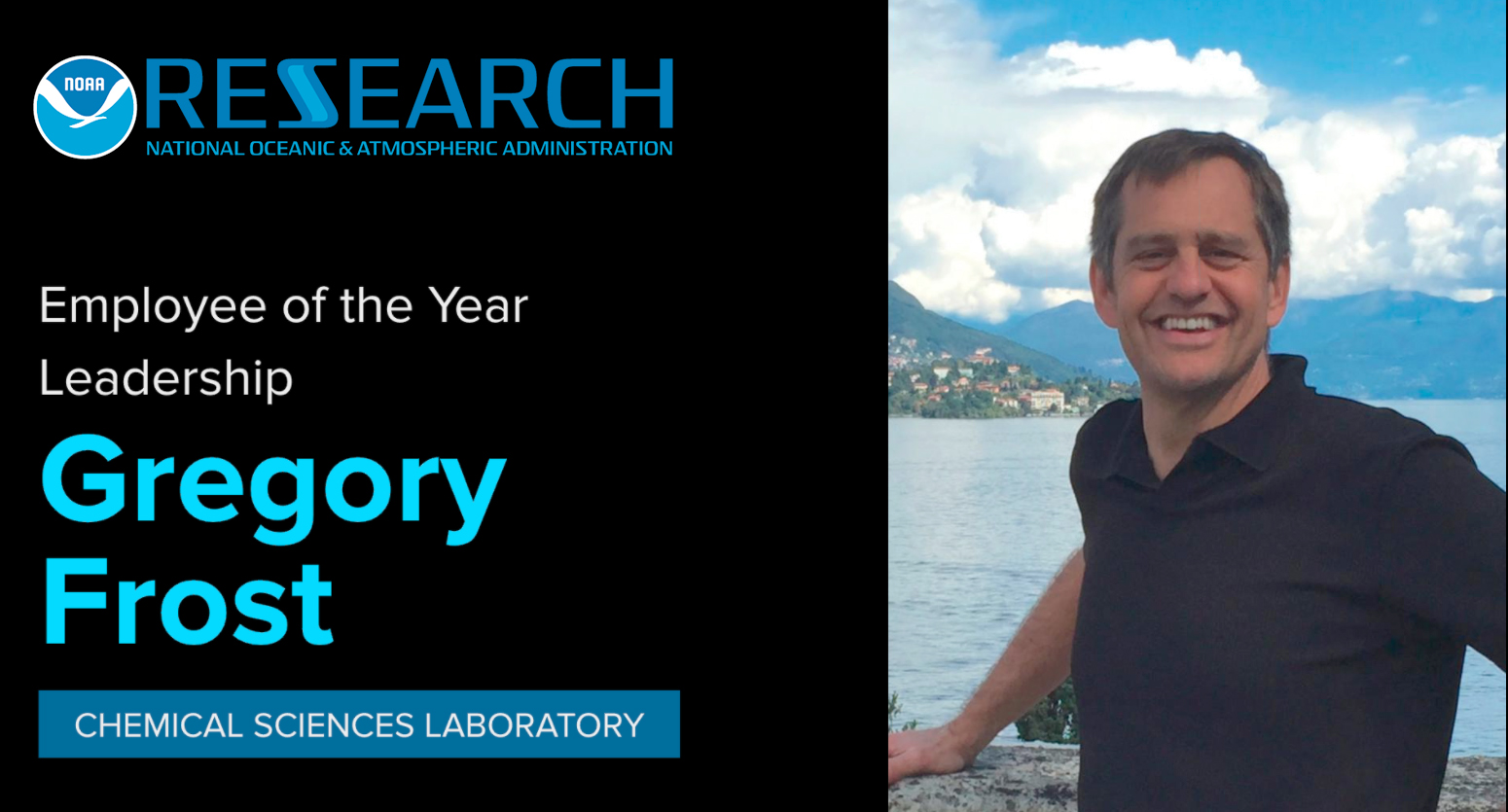A .gov website belongs to an official government organization in the United States.
A lock () or https:// means you've safely connected to the .gov website. Share sensitive information only on official, secure websites.
2 December 2021

Recognized for Leadership, Gregory Frost receives a 2021 OAR Employee of the Year award "for extraordinary leadership in coordinating atmospheric composition and chemistry research across OAR programs, laboratories, and NOAA Line Offices and enhancing the role that atmospheric composition and chemistry plays in NOAA achieving its mission."
As a Research Chemist serving as the Liaison for Atmospheric Composition and Chemistry for OAR, Dr. Frost responded quickly to the unique opportunity presented by the COVID-19 pandemic beginning in March 2020. The global slowdown caused by the early pandemic allowed OAR and partners to study the implications of unprecedented reductions in anthropogenic emissions, to quantify how atmospheric composition changed in response, and to evaluate the consequent impacts on air quality, Earth's radiative balance, weather, and climate. Dr. Frost was instrumental in implementing a robust research campaign across the U.S. to obtain the observations needed to understand the changes and impacts that were occurring. In his liaison role, Dr. Frost skillfully coordinated and obtained funding for the OAR laboratories and programs to quickly implement a comprehensive research campaign. The datasets, associated analysis and publications demonstrated the atmospheric significance of the pandemic response. The overall effort demonstrated to NOAA and the Nation the value of OAR's responsive network of atmospheric composition and chemistry researchers in addressing evolving and emerging societal issues.
In his role as NOAA Earth's Radiation Budget (ERB) Program Manager in the OAR Climate Program Office, Dr. Frost continues to guide the expansion of this new OAR initiative that focuses on stratospheric aerosol and marine aerosol-cloud research related to climate intervention methods. ERB is a unique Congressional initiative that reflects the growing imperative to find options to delay the worst consequences of climate change for the Nation. With a doubled appropriation to $9M in FY21, Dr. Frost directed support to 30 projects that bring together leading researchers from OAR laboratories and their cooperative partners to investigate the natural processes and human activities that alter the reflectivity of the stratosphere and troposphere and potentially impact the Earth system. The ERB initiative is advancing our understanding of atmospheric processes related to climate intervention and providing the Nation with the scientific evidence to address an emerging societal issue. Dr. Frost's leadership in forming this program in its first years is a tremendously valuable contribution.
The evolution of NOAA's Next Generation Global Prediction System (NGGPS) to a national Unified Forecast System (UFS) is expanding critical weather forecasting research to operations (R2O). A critical part to this evolution is the inclusion of atmospheric composition and chemistry in order to improve the accuracy of weather forecasts. In his roles as OAR Liaison and CSL Research Chemist, Dr. Frost seized upon this opportunity by coordinating and working with scientists across OAR, NWS, and NESDIS to develop NOAA's new global atmospheric composition forecasting model. Beginning in FY21, the first version of FV3GFS-Aerosols became operational as a member of NOAA's Global Ensemble Forecasting System (GEFS). For the first time, FV3GFS-Aerosols allows for the inclusion of aerosol processes and abundances to improve weather forecasts. Dr. Frost has held several lead roles that have facilitated bringing together OAR, NWS, and NESDIS staff to incorporate atmospheric composition and chemistry into UFS, a milestone in its development. NOAA's forecasting capabilities are being enhanced thanks to Dr. Frost's steadfast leadership over incorporating atmospheric composition and chemistry into NOAA's modeling systems.
In FY21, Dr. Frost's efforts as OAR Liaison substantially increased awareness and support of the atmospheric composition instrumentation (ACX) on NOAA's next generation of geostationary satellites, GeoXO. As a result, the new NOAA Administrator formally indicated his support of ACX going forward as a NOAA funding priority. GeoXO ACX represents a sea change in how the US will monitor air quality and conduct air quality research and hence will become fundamental to NOAA's mission to inform forecasts and warnings that save lives and protect property. Dr. Frost's team has established that seven NOAA application areas will benefit from GeoXO ACX capabilities: air quality forecasting; weather and climate forecasting; fire weather forecasting; hazards forecasting; stratospheric ozone monitoring; greenhouse gas monitoring; and air quality monitoring. Continuing in this role, Dr. Frost is now the lead of a new working group whose objective is to demonstrate the value of ACX to potential users. Dr. Frost's leadership and coordination across OAR laboratories and programs, NOAA Line Offices, and other U.S. agencies in establishing the importance of ACX demonstrates his strong commitment to NOAA's missions and the importance of atmospheric composition and chemistry to achieve that mission in the long term.